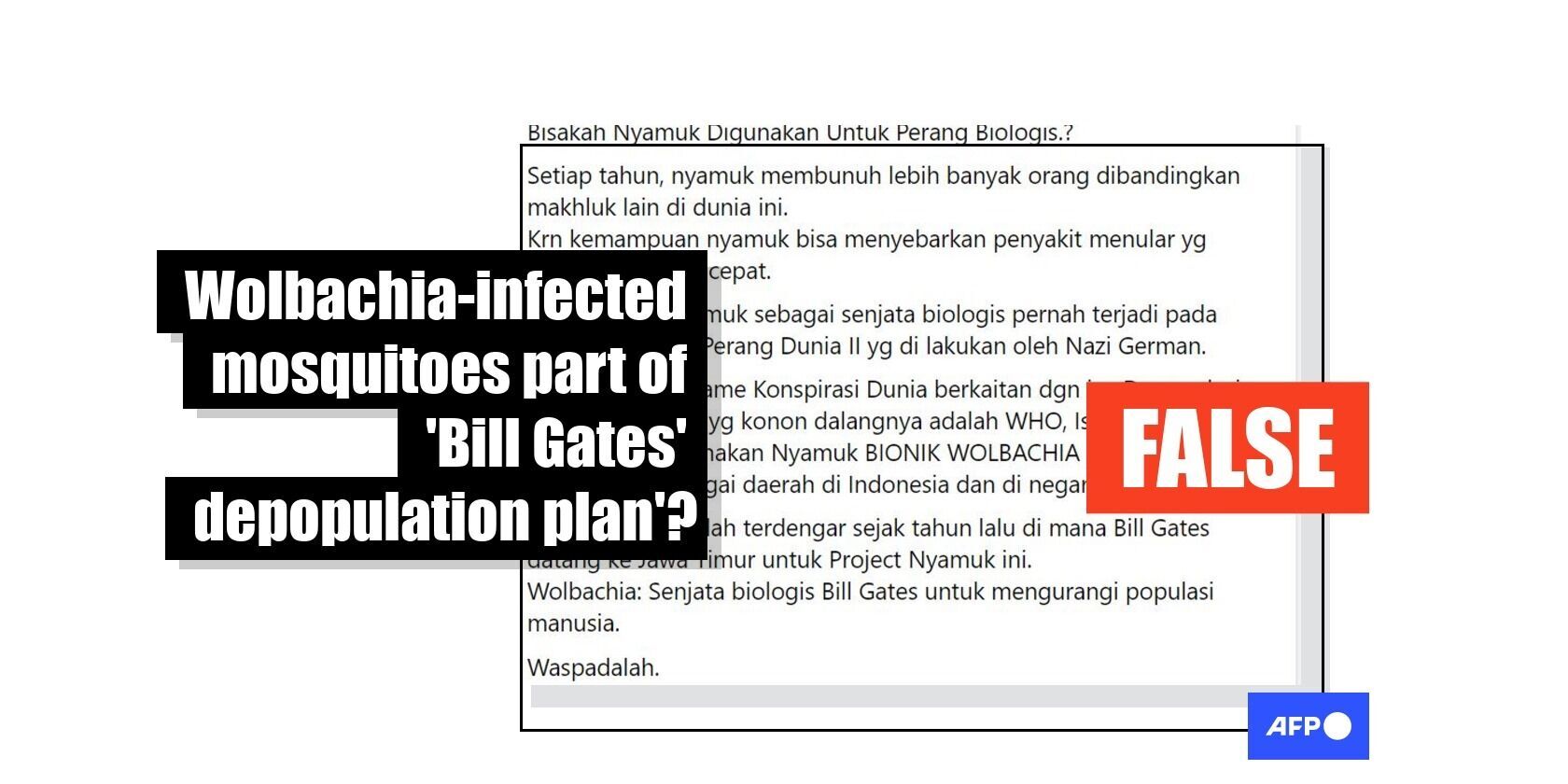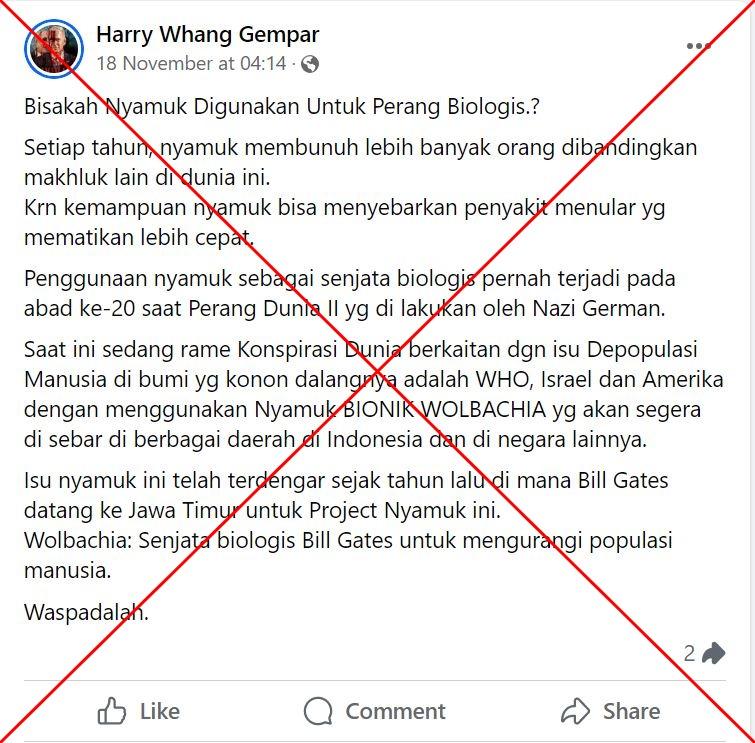
Experts rubbish claims that Wolbachia mosquitoes are 'part of depopulation plan'
- This article is more than two years old.
- Published on December 7, 2023 at 06:54
- 3 min read
- By AFP Indonesia
"Wolbachia: Bill Gates' biological weapon to decrease the human population," reads part of an Indonesian-language Facebook post uploaded here on November 18, 2023.
The post claims the depopulation plan, "whose masterminds are allegedly the WHO, Israel and America", is using "WOLBACHIA BIONIC Mosquitoes that will be spread in various areas in Indonesia and other countries".

Wolbachia are bacteria that block diseases like dengue, Zika and chikungunya from growing in the bodies of mosquitoes (archived link).
This has been harnessed by the Bill and Melinda Gates Foundation-supported World Mosquito Program (WMP), which partners with local communities to release Aedes aegypti mosquitoes carrying the bacteria into the wild, helping to reduce the transmission of these diseases (archived link).
The World Mosquito Program Yogyakarta (WMPY), run by the Centre for Tropical Medicine at Gadjah Mada University, first released these mosquitoes into Indonesia in 2014, in Yogyakarta province on Java island (archived links here and here).
Similar claims linking the mosquitoes to depopulation were also shared elsewhere on Facebook here and here.
Other posts on Facebook and TikTok claimed the mosquitoes would infect people with Japanese encephalitis as part of the depopulation plan, while posts on Facebook and X, formerly Twitter, claimed the mosquitoes would transmit "LGBT genes".
They circulated as health authorities planned to expand the Wolbachia mosquito programme to other parts of Indonesia, including Jakarta, Bandung and Semarang, to help curb dengue (archived link).
But plans to expand the programme to Bali were temporarily shelved because of objections from local residents (archived link).
The claims about Wolbachia mosquitoes, however, have been rubbished by experts and the Indonesian Health Ministry.
'An extremely terrible hoax'
Wolbachia is a common type of bacteria found in a variety of insects and has no potential to make humans or animals fall sick, according to the US Centers for Disease Control and Prevention (CDC) and Singapore's National Environment Agency (NEA) (archived links here and here).
During a question-and-answer session at the Indonesian Ministry of Health on November 20, Dr Riris Andono Ahmad, director of the Centre for Tropical Medicine at Gadjah Mada University, said that scientists infect Aedes aegypti mosquitoes with Wolbachia bacteria (archived links here and here).
"Wolbachia cannot be transmitted to humans," he said. "Wolbachia can only survive in insect cells. They block the dengue virus."
Dr Riris said that if Wolbachia mosquitoes mate with wild mosquitoes, either their eggs would not hatch or they would breed Wolbachia mosquitoes, which are unable to transmit dengue.
He also explained that Aedes aegypti mosquitoes infected with Wolbachia do not trigger genetic mutations in humans nor do they result in human depopulation.
"It is an extremely terrible hoax," the communicable diseases expert said, responding to the claim that the mosquitoes are "human-killing weapons".
"There is no genetic mutation at all, in the bacteria or the mosquitoes," Dr Riris said.
In posts uploaded to Facebook and Instagram on November 25, 2023, the Indonesian Health Ministry said, "Wolbachia bacteria occur naturally in 60 percent of insects, they are not engineered" (archived links here and here).
The ministry also said Wolbachia-infected mosquitoes are not genetically modified organisms as they do not genetically alter mosquitoes nor the Wolbachia bacteria.
Singapore's NEA concurs, saying on its website, "The Wolbachia-carrying Aedes aegypti mosquito is not considered a genetically modified organism, as confirmed by the Genetic Modification Advisory Committee (GMAC) in Singapore (archived link).
"This is because there is no tampering or modification of the genes of the mosquito."
According to the Indonesian Health Ministry, Wolbachia mosquito trials in Yogyakarta province have reduced dengue infection cases by 77 percent and dengue-related hospitalisations by around 86 percent (archived link).
Dr Riris also said the Wolbachia mosquitoes do not cause any illnesses, including Japanese encephalitis.
As explained by the World Health Organization (WHO), the Japanese encephalitis virus is transmitted to humans through infected Culex mosquitoes, mainly Culex tritaeniorhynchus, not Aedes aegypti mosquitoes (archived link).
AFP previously debunked claims that Wolbachia mosquitoes would spread a new virus.
Copyright © AFP 2017-2026. Any commercial use of this content requires a subscription. Click here to find out more.
Is there content that you would like AFP to fact-check? Get in touch.
Contact us
